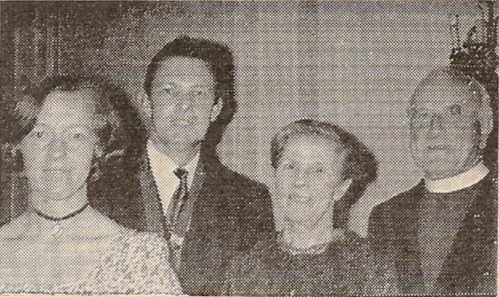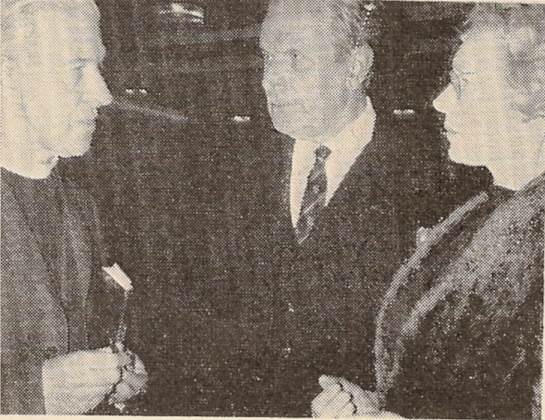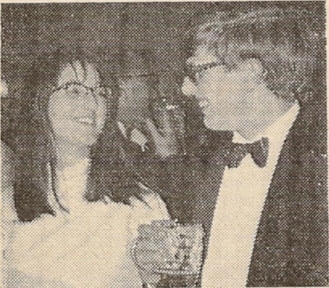 |
The speaker was Mr. John Freeman, president of the Central Council, when, as guest speaker, he proposed the toast to the Winchester and Portsmouth Diocesan Guild of Change Ringers at their third annual dinner held at the Royal Hotel, Southampton, on April 24.
There was no doubt about the success of the festivities this year, for a crowded dining room (between 150 and 160) included a balanced company of young and not so old persons of both sexes, who enjoyed a regal meal.
GUILD’S EFFORTS APPLAUDED
Immediately following the loyal toast, proposed by the master (Mr. Roger Savory), Mr. Freeman rose to propose “The Guild” and amused the company with a succession of after-dinner stories. Having everyone in a receptive mood, he then proceeded to extol them to encourage the young and to continue progressing with their peal ringing.
Mr. Freeman applauded the guild’s efforts in the realms of peal ringing, for they were active, bouncing and vigorous in this sphere and he hoped they would long continue to be so. “It was said that one generation climbs on the shoulders of another, and this was true of ringing. We can all learn and benefit from people who have gone before,” he said, “but it was important to encourage young people to take an active part in guild affairs. They should take office in a district or branch and be ready to take over later one of the guild’s offices, for the administrative side was of equal importance to that of peal ringing.”
This, of course, meant that the older ringer must be prepared to stand down. If anyone held an office for 30 years, as happened on some occasions, it meant that a whole generation had been missed out. Having served for ten years and then to retire prevented anyone from becoming stale in an office.
If any young people derived enjoyment from the activities of a guild they should be prepared to take an office to relieve the older ringer, and, in doing so, new ideas would be injected into its affairs. He invited the company to rise and drink the toast to the guild, which had, he was sure, such a bright future ahead of it.
 |
BRINGS ITS OWN REWARD
The Bishop of Winchester (Rt. Rev. S. Falkner Allison), the guild’s president, replied and expressed appreciation for the conscientious way bellringers served the Church. He told of the rewards given to ringers in days gone by - a jug of ale often tipped into a container holding as much as 4½ gallons. Churchwardens’ accounts spoke of “beer for the ringers,” but he doubted if any churchwardens today would agree to this payment!
In these days all present would agree that ringing brought its own reward, and the satisfaction of participating in a peal was comparable to someone in an orchestra or choir. There was in every walk of life the few who complained about the efforts of others and did nothing themselves, but there were many others who were grateful, even though they did not say so. It was this latter group who made up the majority and who were the responsible people in the world. He thanked the guild for their hospitality to himself and his wife, and to all ringers for the service they rendered to the Church.
EASE AND CLARITY
Mrs. Madeline Croft was entrusted with the toast to the visitors. Her speech had been carefully prepared and was delivered with an ease and clarity which was at once an example to many older and more experienced speakers among the males present. Coming from Lincolnshire, she was able to tell stories of the capabilities of the Central Council president, and she also greeted, on behalf of the guild, the many clergy and their wives who were present, and the many ringers and friends who had travelled long distances, together with those who came from just over the border. To visitors who were there for the first time and to those paying a return visit, as well as the exiles whom it was heartwarming to see again, all were warmly welcomed. To Mr. Pat Cannon a particular reference was made and of his visits to Lincolnshire, where he would “stir up the local youths” and ring peals on unpealable bells - himself, of course, on the tenor.
QUITE SATISFIED WITH R.W.
Mr. Cannon, who responded, expressed thanks on behalf of all the visitors for the splendid meal, the warm welcome and the excellent organisation. He mentioned several prominent ringers in the guild, and his “asides” and (at times) unconscious humour brought much laughter and applause. Regarding The Ringing World, he said he was one of the many people who were satisfied - quite satisfied - with it. He then contradicted this statement by adding that there was one thing he did not like (loud laughter). “We could do with a few more ‘hotted up’ letters,” he said, “a bit more acrimonious, as they were in the old days” (more laughter). He did not approve of letters over a nom de plume, however.
[At this point a voice said “Speak up, Pat - we can’t hear you,” which brought forth the reply “That’s unusual,” from Mr. Cannon.]
He considered the Leader “So what?” in the current issue of The Ringing World the best for some time, for it was a fact that young people today never had it so good. Don’t sneer at past generations, he added. Quarter peals, too, were worth reading and showed the progress of a guild more so than the peals did, for many more local ringers were involved and more shared in the honours. Mr. Cannon concluded by thanking the guild for its hospitality, and wished for it continued success and prosperity.
 |
Between the speeches three leads of Treble Ten were rung by Mrs. Marshallsay, Miss K. Maundrell, Messrs. D. T. Matkin, W. Croft and K. Croft. There was also a presentation to Mrs. Tom Chapman, who had served the guild as an officer before moving out of the district. The master handed Mrs. Chapman a music token with the thanks and best wishes of the members.
The chairman also acted as master of ceremonies and introduced, the speakers, each on a personal note and with friendly greeting. At the close of the formal proceedings he thanked the committee and all concerned with the arrangements which, there was little doubt, were worthy of the applause accorded.
 |
THOSE ATTENDING
Seated at the top table were Mr. R. Savory and Mrs. Savory, the Bishop of Winchester (Rt. Rev. S. Falkner Allison) and Mrs. Allison, Mr. J. Freeman and Mrs. Freeman, Mr. D. J. Forder (general secretary) and Mrs. Forder, Mr. A. P. Cannon, Mr. K. Croft (treasurer) and Mrs. Croft, Canon K. W. H. Felstead and Mrs. Felstead, Miss J. Freeman, Mr. C. W. Denyer (editor, R.W.) and Mrs. Denyer.
The Revs. R. Milner and Mrs. Milner, J. Symonds and Mrs. Symonds, C. C. Green, S. Milliken and Mrs. Milliken, D. Lockyer and Mrs. Lockyer, R. Chamberlain and Mrs. Chamberlain, C. Spedel and Mrs. Spedel.
Mesdames B. Woodruffe, B. Mackrell, G. Northway, B. Butler, W. J. Cope, L. Duguid, S. Dando, J. J. Hill, L. Hatfield, A. Harrison, J. Hunt, T. Tarrant, A. Goodyear, J. Dowling, R. Smart, T. Chapman, W. Young, P. N. Tubbs, C. H. Kippin, Pickford, G. Warner, J. Wimlett, A. V. Davis, D. T. Matkin, Rich, P. Murduck, M. Goss, Watts, F. E. Collins, M. Marshallsay.
Misses S. Millar, C. Edwards, P. Goodall, M. Elmes, M. Turner, A. Davies, K. Maundrell, H. Kippin, H. Marchment, R. Jackson, J. Grant, P. Tubbs, D. Bromley, J. Butler, D. Maggs, F. Riley, E. Banks, W. Brown, D. Ward, J. L. Quaife, S. Lynds, M. Sutcliffe.
Others present were: Messrs. M. J. Butler, B. Butler, B. J. Woodruffe, R. E. J. Dennis, John Croft, J. Hartless, C. J. Butler, P. Harrison, R. N. Marlow, James Croft, W. S. Croft, B. Mackrell, L. D. Smith, T. Matcham, J. Hunt, C. Harrison, L. Hatfield, N. George, J. Richardson, R. Allinson, A. P. Smith, I. McCallion, R. Green. J. J. Hill, N. Cotton, H. Smith, W. J. Cope, L. Duguid, S. Duguid, N. Snape, B. Walton, J. Colliss, S. Dando, B. J. Fry, H. Hill, M. Lynds, A. A. J. Buswell, J. Wimlett, A. Tarrant, G. Warner, T. Pickford, C. H. Kippin, P. N. Tubbs, W. Young, R. Bradley, P. Randall, T. Tarrant, S. Lynds, A. Goodyear, A. Sleight, G. Dowling, R. Smart, T. Chapman, G. C. Grant, G. Cooper, A. A. Nunn, F. E. Collins, T. F. Collins, B. Murduck, B. Oaks, A. Watts, M. Goss, P. Watts, D. Payne, P. Murduck, C. Kendall, W. Rich, G. Elmes, D. T. Matkin, K. Cook and A. V. Davis.
The Ringing World No. 3133, May 14, 1971, pages 415 to 416